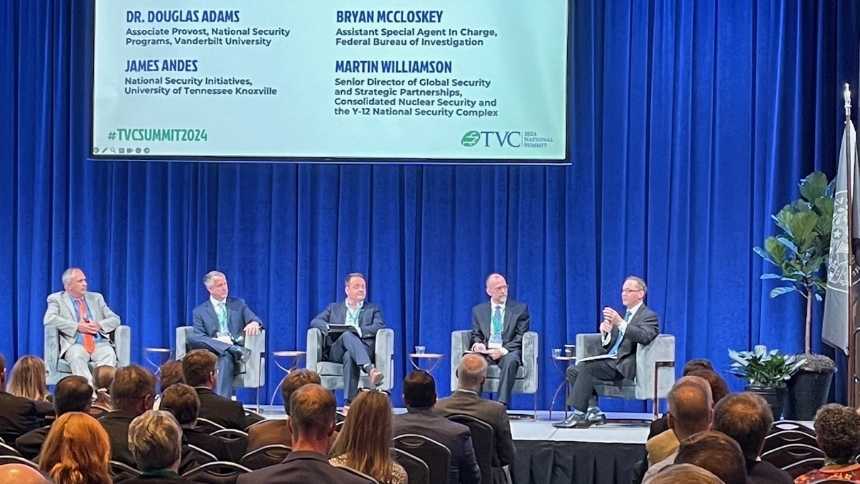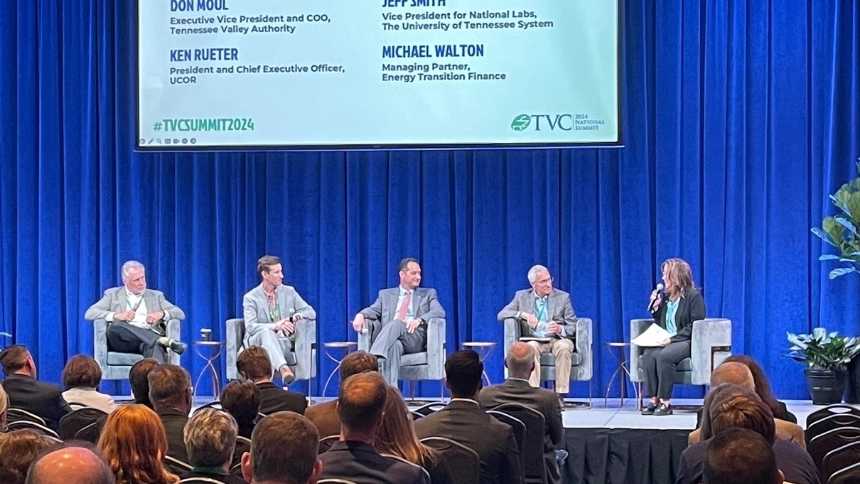
East TN’s assets on display during first day of TN Valley Corridor National Summit
Focus was on national security and advanced energy solutions.
The Volunteer State in general and East Tennessee specifically were clearly on display as the Tennessee Valley Corridor opened its 29th National Summit in Nashville on Wednesday.
Whether it was speakers, moderators or panelists, or the great assets that they represented, the region showed well during the first half day of the event spread over two days at Vanderbilt University. The Summit wraps up shortly after 12 noon CDT on Thursday.
The first Summit was held in Oak Ridge in 1995, spearheaded by then newly elected Third District Congressman Zach Wamp. Over the years, it has spread to 13 other Congressional Districts across Alabama, Kentucky, North Carolina, Tennessee, and Virginia. Several of those members of Congress and two U.S. Senators either spoke on Wednesday or are scheduled to speak Thursday.
One was U.S. Senator Bill Hagerty who said, “We have a number of great assets” in Tennessee. With national security being top of mind, he led with Fort Campbell, home of the 101st Airborne. Others were the usual ones: Oak Ridge National Laboratory (ORNL), Y-12 National Security Complex, Holston Army Ammunition Plant, Arnold Engineering Development Center, Tennessee Valley Authority, and “three incredible research institutions” (University of Memphis; University of Tennessee, Knoxville {UTK}; and Vanderbilt).
“Those components come together to make Tennessee a vital part of the nation’s national security,” Senator Hagerty said, before adding, “How do we win the challenge the nation faces? By unleashing our innovative spirit.”

The focus on Wednesday was on two topics – “Securing America’s Security and Global Leadership” and “Forging Tomorrow’s Advanced Energy Solutions.” Sean Williams, President and Chief Executive Officer (CEO) of Knoxville-based Protection Strategies Inc., moderated a panel that featured James Andes, UTK Director of National Security Programs, and Martin Williamson, Senior Director of Global Security and Strategic Partnerships at Y-12, along with Douglas Adams, Associate Provost for National Security Programs at Vanderbilt, and Bryan McCloskey, Assistant Special Agent in Charge with the FBI.
Later, Tracy Boatner, President and CEO of the East Tennessee Economic Council, moderated an all East Tennessee panel that featured Don Moul, Executive Vice President and Chief Operating Officer of TVA; Ken Rueter, President and CEO of United Cleanup Oak Ridge; Jeff Smith, UT Vice President for National Labs; and Michael Walton, Managing Partner at Energy Transition Finance.

The panel followed a presentation by Moul where he noted that the seven-state region served by the nation’s largest public utility is growing at three times the rate of the nation as a whole. The drivers are people moving into the region, “the electrification of everything we use,” and economic development.
Moul talked about nuclear – it is 43 percent of the current generating capacity – and solar – 4,000 megawatts either in operation or under development and a goal of 10,000 megawatts by 2035.
“We can build a future through partnerships and innovation,” he said, striking a similar theme that had been emphasized by Senator Hagerty.
The panel featured four members of the Governor’s Tennessee Nuclear Advisory Council – Moul, Smith, Rueter and Boatner.
Smith offered his thoughts on the reasons that the Governor created the group, and they reinforced the points that Moul had made. Tennessee is known as a business friendly state, and the growth of the automotive industry reflects that reality. However, demand for energy is outstripping supply unless nuclear becomes a more significant contributor to continue fueling that and other industries.
And, as several of the panelists noted, there are other critical elements – from the availability of a well-trained and extremely qualified workforce to the viable supply chain needed to support the industry.
Moul noted that there is much more bipartisan support for nuclear than he has seen in his 37 years in the utility sector.
No Longer Just Turning People Into Soldiers
One of the uniquely insightful points was made Major General Brett Sylvia, Commanding General of the 101st Airborne. Using just two slides – one about the 101st and the other about Fort Campbell, he said that the role of the Army has evolved. For years, it was about turning people into soldiers. Now, it’s about turning adolescents into adults. To illustrate the change, he cited for the more than 300 people who registered for the Summit several statistics. One was the fact that high school students for years universally had a driver’s license by the time they graduated. Today, one in four do not.
As most people know, many Army jobs require an ability to drive – from a Humvee to much larger vehicles.
Like what you've read?
Forward to a friend!

